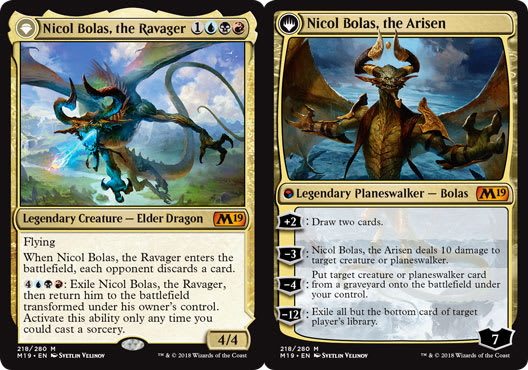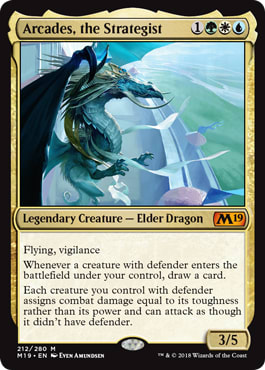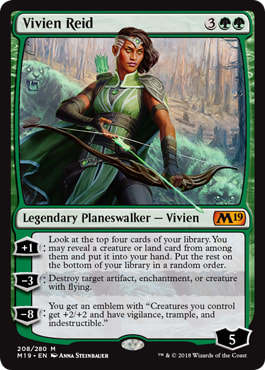Bolas should've mopped the floor with Yasova, Baishya, and Naiva, obviously. He's the most powerful Planeswalker of them all, and they're just some random barbarians. If we look purely at power levels, it's impossible to have a satisfying conclusion to the Magic 2019 storyline, just as it's impossible to write satisfying stories about Pre-mending 'walkers generally.
It's a good thing that literature isn't based on "power levels", then, isn't it? Oh, sure, they serve a useful purpose in fan engagement, and in game design. The capacity to quantify power in broad terms of who would win in a fight under ideal conditions can be a handy tool for writing, and a great way of drawing the kind of energy you get in sports fandoms into fandoms for serial prose, comics, and anime. And yet, narrative draws upon specific scenarios that make hash of any ideal dueling ground, to a thematic end that might demand an unexpected result.
This is what we see in Kate Elliot's narrative of Nicol Bolas and his twin Ugin. Scenario-wise, these mere mortals have the scales tipped considerably in their favor by another Planeswalker, they have inside information about Bolas that allows them to craft a story designed to play on his greatest fears, psychic protection from the Hedrons, and real supporting facts that, even if Bolas reads their mind, will still be true: Ugin's plan all along really was to delay Bolas on Tarkir long enough to magically trap him.
The story built considerably the notion that Bolas's greatest fear is to be trapped, to be stunted, to have his power restrained. This fear is reinforced repeatedly through his early life. He has good reason to be wary of Ugin's deceptive side. If you're really wedded to the idea of Bolas as infallible mastermind, there's plenty of information to work with here, ready to explain his strategic retreat from Tarkir.
But how much of "Bolas as infallible mastermind" comes from the text of Magic's stories, and how much comes from Bolas's own hype about himself? This is an important question to ask in the wake of this story, given its thematic content. The Magic 2019 story is all about history, who controls it, and how it is affected by the agenda of those who have power.
To pick at this theme, let's take a moment to talk about the Elder Dragon War.
The Elder Dragon War wasn't how I imagined it. When I read about the losers of the war being cast down magically to become the Elder Land Wurms, the whole thing felt mythic in scope. The story as related by Ugin is a lot less epic. It's still a bunch of powerful dragons battling for control of an entire world, but it comes across more as a sordid colonial scramble not unlike the conquest and decimation of Argoth during the Brothers' War several millennia later. Perhaps that's just what any mythic tale looks like from below, though. The sacking of Troy for the sake of the egos of a few aristocratic men probably didn't feel very epic to the average people caught in the crossfire.
In one sense, then, because I'm also into big bombastic spectacle, the Elder Dragon War turning out largely to have been a bunch of greedy, entitled dragons dominating everyone around them is a bit of a let down. I'd still, on some level, like to read the romantic and dramatic version of the war. But this story is disappointing in a productive way, because it uncovers the extent to which romantic, dramatic accounts are written for the edification and agenda of the dominant class - in this case, literal greedy, arrogant dragons.
While there's still certainly grand moments in this story, the overall effect, as in other recent stories, is one of demystification. Bolas no longer is this fully formed grandmaster of the multiverse. Now he has an origin, a twin, and a history of struggle and fear and weakness. In many moments in the story, he's pitiable.
This idea of a dragon of Bolas's power being weak, bested by humans, running from danger, reacting out of a primal fear of being trapped and controlled, is positioned within the narrative itself as transgressive. This, like the other Khanish knowledge on Tarkir, is suppressed by the dragonlords. While they are not necessarily as cunning as Nicol Bolas, they don't have to be. Suppressing any knowledge that runs counter to the people in power requires only power and a basic sense of self preservation to carry out. This is another core theme of this storyline: that power does not necessarily demand urbanity, wit, or some internally adhered to moral code. It demands "class," but only in the sense of being at the top rung of society, dominating the lower classes.
Consider one of Nicol Bolas's recent victories, one narratively designed to demonstrate his power and credibility as a threat. Nicol Bolas certainly overwhelmed and humiliated the Gatewatch, but it's worth remembering that the Gatewatch went into battle against him exhausted and without a plan. I'm not saying they could've won - Ajani was right to warn them off from the encounter. What I'm saying is that the Gatewatch had experienced the trauma of watching an entire society suddenly and apocalyptically falling into genocidal violence which they were powerless to stop, and in that traumatized state were easy prey for Bolas.
Nicol Bolas beat the Gatewatch because he has no scruples about brutalizing an entire population in order to do it.
It doesn't take some illustrious genius to order a genocide. Believing so cedes power to monsters in our world that should not be surrendered. What bothers me about fan discourse around villainous power is that the subtext often seems to suggest that there's no recourse for the powerless but to give up and just die already, or at best wait for some other superhero to come along and save the day. If option 2 doesn't seem likely, well, there's always option 1.
Given we're talking about narrative and history serving particular interests, whose interests are served by such narratives, do you think?
Power fantasies, even villainous power fantasies, can be enjoyable, don't get me wrong. Recognizing the dark side inherent in the power of Planeswalkers doesn't negate their potential fascination. Cassandra Khaw, writer of the upcoming Vivien Reid stories, describes earlier Planeswalker stories as horror stories: "Omnipotent gods slowly growing bored of their own immortality, hungry for sensation, for new experience, endlessly swallowing up worlds, forcing creatures into combat and then discarding across the universe. There's just so much intrinsic horror there." The lasting presence of horror as a distinct literary genre speaks to the pleasure that can come from exploring such ideas.
There's something worrying, though, in the way horror can slide into a perverse kind of admiring awe or respect. These responses reveal an unconscious conviction that the powerful get where they are through some sort of meritocratic means. You've got to hand it to Bolas/Palpatine/Thanos/&c, they may be evil but they're men with vision and the brilliance to see that vision out! Or: this person may believe in heinous things but by god he fights for his awful, murderous beliefs with respect for norms and procedures and decency! As soon as you stick Lawful in front of Evil people seem to lose all capacity to recognize that second part of the alignment.
Now, to be fair to an argument that, uh, isn't really the argument I'm critiquing here but which will come up I'm sure if I don't fend it off, WotC probably bears some responsibility for some of the exaggerated expectations about Nicol Bolas. Playing up his genius and overwhelming power makes good marketing copy, after all. There's that tension between forms of fan engagement again - Bolas as the Ultimate Heel doesn't necessarily line up perfectly with Bolas as a narrative device that has to be written around. It's worth keeping in mind, though, that some of the people most responsible for developing the narrative of Nicol Bolas in the present day or even the recent past weren't around for the setup of his great scheme. The offhanded reveal that Bolas's plan with the Eldrazi was to just prompt Planeswalkers to come together so he could, I guess, test his strength against him is a bit of a letdown, but that scheme got its start with Creative head Brady Dommermuth, who hasn't worked at the company for six years now! If WotC wrote some checks it couldn't cash with Bolas, it's probably worth keeping in mind that the WotC trying to cash those checks now has a different body than when they were written. That doesn't make the reveal particularly satisfying, but it is what it is.
But I think to some extent this fandom and fandoms generally do this to themselves, convince themselves that there's no way the Big Bad could win so hard and so often while also being foolish, hotheaded, short-sighted, arrogant, pointlessly sadistic, riddled with hangups, and above all else prone to telling grandiose lies about how none of their other flaws and moral failings exist.
Distressingly, that final personality flaw seems frequently to work to the advantage of those in power, both in fantasy and in reality.
What the Magic 2019 story suggests is that we should be suspicious of the narratives those in power sell about themselves, whether human or dragon, politician or corporation (even Wizards of the Coast!), overtly villainous Bolas or... yes, even Ugin. I came away from this story with more questions about Ugin and his motivations. He didn't exactly see fit to mention to our girls that he's the source of the dragonstorms and directly responsible, via Sarkhan's meddling, for the cruel domination of Tarkir by the Dragonlords.
What I'm saying is, cultivate a healthy skepticism about dragons, distrust hagiography, and keep looking for histories not written by the victors. And don't stop looking for the utterly implausible, narratively unsatisfying ways that the powerful can be duped, manipulated, and bested by mere mortals. Those are the methodologies that we have.
























